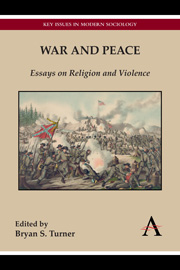Book contents
- Frontmatter
- Contents
- Acknowledgments
- Contributors
- Introduction by Bryan S. Turner
- War
- Peace
- Chapter 5 Quakers, the Origins of the Peace Testimony and Resistance to War Taxes
- Chapter 6 A Sacred Ground for Peace: Violence, Tourism and Sanctification in Hiroshima 1960—1970
- Chapter 7 The Sectarian as a Category of Secular Power: Sectarian Tensions and Judicial Authority in Lebanon
- Chapter 8 The Commodification of Love: Gandhi, King and 1960s Counterculture
- Chapter 9 The Religion of Brotherly Love: Leo Tolstoy and Max Weber
Chapter 5 - Quakers, the Origins of the Peace Testimony and Resistance to War Taxes
from Peace
Published online by Cambridge University Press: 05 May 2013
- Frontmatter
- Contents
- Acknowledgments
- Contributors
- Introduction by Bryan S. Turner
- War
- Peace
- Chapter 5 Quakers, the Origins of the Peace Testimony and Resistance to War Taxes
- Chapter 6 A Sacred Ground for Peace: Violence, Tourism and Sanctification in Hiroshima 1960—1970
- Chapter 7 The Sectarian as a Category of Secular Power: Sectarian Tensions and Judicial Authority in Lebanon
- Chapter 8 The Commodification of Love: Gandhi, King and 1960s Counterculture
- Chapter 9 The Religion of Brotherly Love: Leo Tolstoy and Max Weber
Summary
Whoever can reconcile this, “Resist not evil,” with “Resist violence by force,” again, “Give also thy other cheek,” with “Strike again”; also “Love thine enemies,” with “spoil them, make a prey of them, pursue them with fire and the sword,” or, “Pray for those that persecute you, and those that calumniate you,” with “Persecute them by fines, imprisonments and death itself,” whoever, I say, can find a means to reconcile these things may be supposed also to have found a way to reconcile God with the Devil, Christ with Antichrist, Light with Darkness, and good with evil. But if this be impossible, as indeed it is impossible, so will also the other be impossible, and men do but deceive both themselves and others, while they boldly adventure to establish such absurd and impossible things.
Robert Barclay, 1678Introduction: Nonviolence and the Society of Friends
Robert Barclay's words, quoted above, have been echoed by Quakers since the seventeenth century and can still be found in the books of discipline and faith published by the Religious Society of Friends today. Barclay's statement followed the spirit of a letter sent in January of 1661 which had been signed by George Fox and many other prominent Quakers (Fox et al. 1660). It was intended to reassure the recently restored monarch, Charles II, of the harmlessness of the Friends, as they called themselves.
- Type
- Chapter
- Information
- War and PeaceEssays on Religion and Violence, pp. 101 - 120Publisher: Anthem PressPrint publication year: 2013



